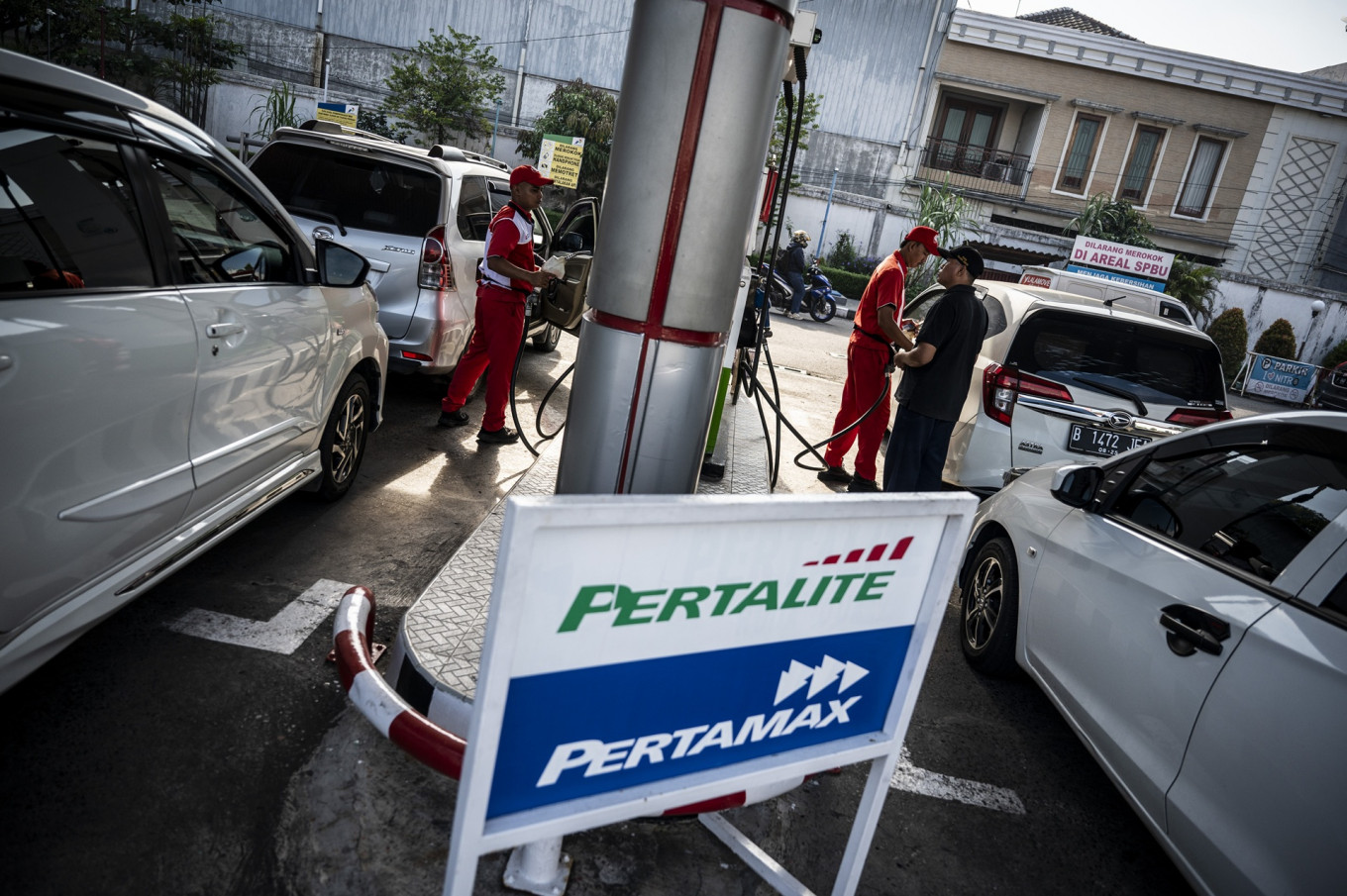Popular Reads
Top Results
Can't find what you're looking for?
View all search resultsPopular Reads
Top Results
Can't find what you're looking for?
View all search resultsLet consumers choose
But if overregulation pushes Shell, BP and Vivo to scale back, or worse, pack up and leave, motorists will be left with fewer choices and Pertamina’s grip on the market will only tighten.
Change text size
Gift Premium Articles
to Anyone
 Attendants of a gas station owned by state-owned energy holding company Pertamina serves customers on Feb. 27 in Semarang, Central Java. The Energy and Mineral Resources Ministry has raised a plan to establish a team to verify the octane number of gasoline amid concerns from the public of fuel adulteration, following a graft investigation by the Attorney General's Office (AGO) pertaining to fuel imports and exports by a Pertamina subsidiary. (Antara/Aprillio Akbar)
Attendants of a gas station owned by state-owned energy holding company Pertamina serves customers on Feb. 27 in Semarang, Central Java. The Energy and Mineral Resources Ministry has raised a plan to establish a team to verify the octane number of gasoline amid concerns from the public of fuel adulteration, following a graft investigation by the Attorney General's Office (AGO) pertaining to fuel imports and exports by a Pertamina subsidiary. (Antara/Aprillio Akbar)
F
or many Indonesian motorists, filling up the tank can feel like a chore. State-owned Pertamina still dominates the downstream fuel market, and its stations often come with one guarantee: long queues.
A breath of fresh air came when private players like Shell, BP and Vivo entered the market, offering nonsubsidized fuel. The price is a little higher than Pertamina’s, but many motorists are willing to pay for what they perceive as better quality and faster service.
This competition is not bad news for the government. In fact, it should be a win. Every liter of unsubsidized fuel sold by Shell, BP or Vivo takes a little weight off the state’s bloated subsidy bill.
Sounds like a perfect scenario, right? Not quite.
This newfound choice keeps getting cut short, as stations run dry every few months. The latest shortage, which has been dragging on since last month, turned once-busy Shell and BP stations into ghost towns, attendants left standing idly by, repeating the same explanation to puzzled motorists: There is simply no fuel to sell.
Analysts point to a recent regulatory change as the culprit.
Starting this year, the Energy and Mineral Resources Ministry shortened the validity of private fuel import permits from one year to just six months, with additional reviews every three months. The ministry says the move is meant to “increase monitoring flexibility,” but critics argue it creates unnecessary hurdles and leaves private players vulnerable to supply disruptions.
What’s more, the government has reportedly asked private retailers to source fuel from Pertamina’s refineries instead of importing it themselves, even when product specifications do not match. This has raised concerns that regulators are tilting the playing field in favor of the state-owned company.
Energy and Mineral Resources Minister Bahlil Lahadalia defends the move, citing Article 33 of the Constitution, which mandates that industries vital to public welfare must remain under state control. President Prabowo Subianto has echoed this sentiment in several speeches, signaling that his administration may lean toward stronger state oversight of strategic sectors.
But if overregulation pushes Shell, BP and Vivo to scale back, or worse, pack up and leave, motorists will be left with fewer choices and Pertamina’s grip on the market will only tighten.
This is not hypothetical. The harsh business climate has already driven out big names like Petronas and Total, who found Indonesia’s fuel retail game was not worth playing.
And let’s be honest, no one wins when competition disappears. Well, no one except Pertamina.
The problem is public trust in Pertamina has already been shaken by scandals and service issues over the past few years.
Earlier this year, the company was rocked by a corruption scandal involving inflated fuel prices and dangerous blending practices that may have compromised vehicle safety. Drivers found themselves paying more for lower-quality fuel, facing higher maintenance costs as a result.
The trust deficit in Pertamina and the shift of customers to private stations should be a wake-up call for the government.
This is the moment to push the state-owned fuel giant to raise its game: Deliver cleaner, higher-quality fuel, cut down those endless queues and match the service standards set by its competitors. With its massive nationwide network, winning customers back would be easy.
At the same time, allowing private retailers to grow sends a strong signal to global investors that Indonesia is open to fair competition. This becomes even more urgent as data from the first half of this year show a decline in foreign direct investment (FDI), a red flag for a country eager to attract capital and create jobs.
The government now stands at a crossroads: Double down on policies that squeeze private retailers for Pertamina’s benefit or keep the market open and competitive.
The smarter move? Trust the market and let motorists decide where to fill up.










